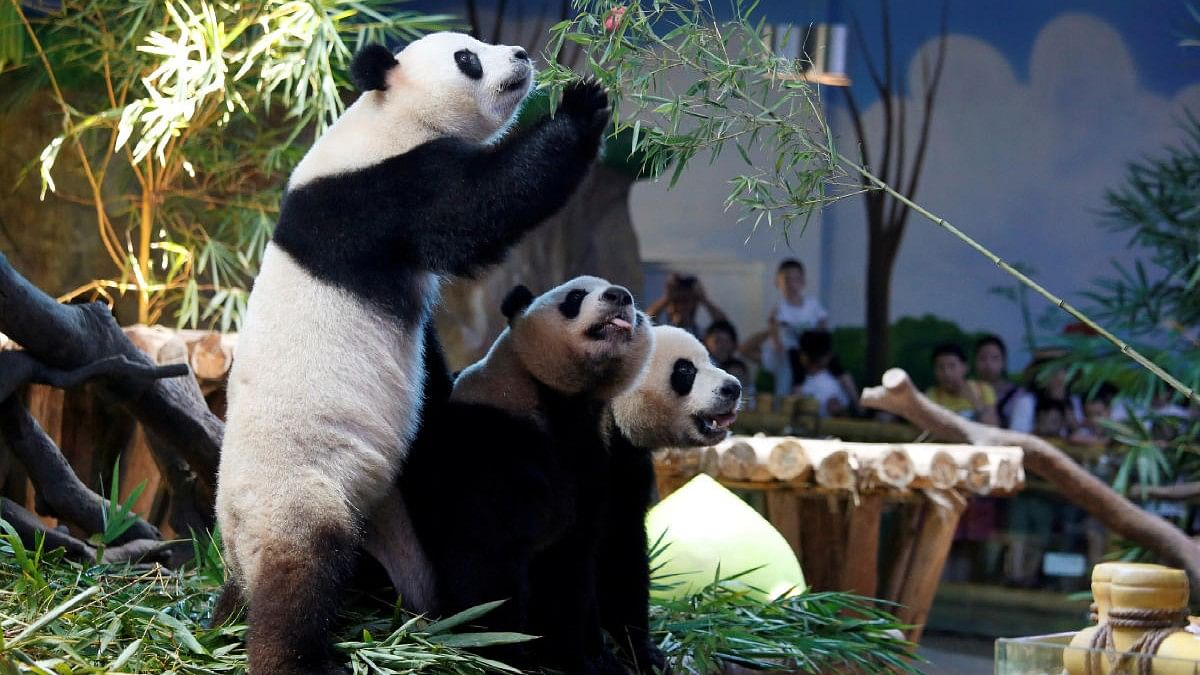
The world's only giant panda triplets Meng Meng, Shuai Shuai and Ku Ku at Chimelong Safari Park in Guangzhou, China. Representative image.
Reuters
Washington: Panda exchanges, like the one that sent two bears to Washington's National Zoo this past week, are governed by closely held contracts. In most countries, they are never released.
Lawyers for the Smithsonian, which operates the National Zoo, cited a confidentiality clause and refused to release a 2020 contract. The US Fish and Wildlife Service, which regulates the import and export of exotic species, provided a San Diego Zoo contract with key passages blacked out.
But my colleagues and I found full copies of those documents and others in regulatory filings.
The contracts govern two pandas at the National Zoo and two more that arrived in San Diego this summer.
Comparing these contracts with past agreements revealed that American zoo administrators are ceding increasing authority to the China Wildlife Conservation Association, a government group that administers many panda agreements.
China's national forestry bureau, which oversees the wildlife group, did not respond to a request for comment.
Here are a few of the terms.
Watch what you tell journalists
The arrival of pandas in Washington and San Diego were highly choreographed media events. But zoo administrators have agreed to limit what they tell journalists.
Administrators cannot discuss panda illness, death, disease or "any other important matters" without first consulting with their Chinese partners, whose views "shall be fully respected."
"In cases where release of related information to the outside world or acceptance of media interviews is necessary, it shall be implemented only after communication and consultation between the parties and a consensus is reached," the contracts read. "And where no consensus is reached, no news shall be released."
In a statement, the San Diego Zoo said it was common for partners to discuss animal well-being "and come to a mutual understanding before sharing updates publicly."
Previous contracts did not contain such "information management" restrictions.
Don't talk about the money
Zoos pay up to $1.1 million a year to rent pairs of pandas from China. To raise money, zoos court donations from everyday people and big-ticket philanthropists.
The arrangement is, at its heart, a rental. China retains ownership of the pandas, and zoos pay for the right to display and breed them for a decade.
But the China Wildlife Conservation Association prohibits zoos from discussing the deal in that way. "Commercial terms such as 'lease,' 'rental,' 'loan agreement' or 'contract' shall not be used," the National Zoo's current contract dictates.
The zoo previously referred to this contract as a "loan." Not anymore. Now it is a "cooperative research and breeding agreement."
But even the term "loan" was a euphemism, said Ron Kagan, former CEO of the Detroit Zoo. Under his tenure, the zoo passed on hosting pandas because of ethical concerns about paying for a threatened species, among other reasons.
"You can call it whatever you want," he said. "It's not a loan if you're paying."
All-expense paid travel
Zoos have agreed to pay for Chinese panda experts to travel to the United States regularly to give advice.
American zoos will pay for airfare, hotels and a daily stipend of $100 to $150 per person. "Payment shall be made by the American Party in cash or by other means directly to the experts themselves," the two contracts say.
Zoos are also required to fly in experts to conduct research, help pandas acclimate and in some cases, consult on procedures like artificial inseminations.
Restrictions on live panda cams
Last year, a panda at the Memphis Zoo, Le Le, died after panda enthusiasts watched him deteriorate on the zoo's live video feed.
The zoo's female, Ya Ya, came under scrutiny, too, with animal welfare groups and Chinese panda fans saying that she was too thin and had mangy fur.
Some even paid for a billboard in Times Square.
The zoo said that Le Le died of heart disease and that Ya Ya had a genetic condition that gave her patchy fur.
Some zoos previously promoted live, round-the-clock panda feeds. Going forward, they have agreed to limit their live feeds.
The San Diego zoo says it will now offer only a daytime feed. The zoo's contract says it may show only "video footage or images that are first reviewed, edited when necessary, and approved" by the zoo.
Melissa Songer, a Smithsonian conservation biologist, said in August that the National Zoo pushed back on this provision. Its contract is less restrictive. But the zoo will offer footage on a delay, Songer said.
Break the rules? Deal's off.
The China Wildlife Conservation Association can terminate the contract and recall pandas to China for a variety of reasons.
The "unauthorized release of relevant information" to the public is one example.
The Chinese group can also recall pandas for "improper feeding management" or "health issues in giant pandas with a risk of death."
These clauses, too, were added after Le Le's death.